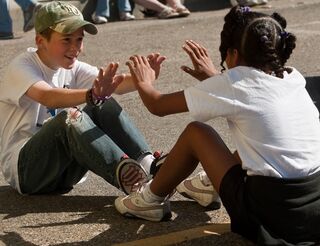
Race and Ethnicity
Are Kids Racist?
Not talking about race with your kids can lead to them having problematic views.
Posted April 2, 2013 Reviewed by Ekua Hagan

Maybe you remember the time your (White) 3-year-old told his (Black) babysitter that he was glad his skin was “nicer than hers” or the time your 5-year-old shouted that the (dark-skinned Latino) man at the end of the grocery aisle had “dirty skin." At that moment, maybe you wanted to shrink away in horror, disown your first-born, and forget the myths of blissful parenthood.
What was going on there? How did you perfectly delightful, well-meaning, angel of a child, whom you’d raised to be so polite and socially appropriate, suddenly take on the shape and sound of a raving racist? If you are like most parents, your child certainly never heard you say something like that.
Or maybe you are one of the parents, like many who enter my laboratory at Yale and like my closest friends and relatives, who explain that your child is definitely not aware of race—in fact, your child is that very product of Dr. King’s vision—able to treat others based on character rather than skin color.
In my experience as a developmental psychologist, White parents tend to fall into these two camps—those who recall in horror embarrassing incidents in which their children made racist comments to strangers or loved ones—and those who are certain their children are colorblind. In reality, our studies suggest neither portrayal is quite right.
In fact, children are not blind to race. Instead, like all of us, they notice differences, seeing that some people have darker or lighter skin or curlier or straighter hair than others. What’s more, they notice that these features of people’s faces, hair, and bodies seem to mean something because in nearly all towns they predict (to a lesser or greater extent) the neighborhoods people live in, the places they shop, and the cars they drive.
White children often learn very quickly that simple questions or comments about these observations are shut down, stopped, and hushed with incredible velocity. Children become aware that this topic must be important because unlike their other questions, these ones go unanswered and leave their parents with looks of worry.
As evidence, Rebecca Bigler and her colleagues at UT Austin found that nearly all White mothers in their research study adopted a “colormute”/“colorblind” approach when discussing a book that was either directly or indirectly about race with their 4-5 year old children; most chose not to discuss race at all. (In case you wonder why I’m focusing on White parents here, previous work has demonstrated that as opposed to White parents, parents of minority children in the U.S. do talk about race and ethnicity quite regularly.)
Now you might be asking yourself—why not avoid talking about race? After all, most of us don’t want our children obsessing on the concept. Well, there are many reasons, but one of the most persuasive to me has been recent work showing that children often come to their own (sometimes worrying) conclusions about race and if they think they can’t discuss them with us, and then these theories do not get checked. After all, children are smart and inquisitive and as such are trying to understand the world around them. As they do so, they often create explanations for why things are the way they are.
Another study by Dr. Bigler demonstrated how children’s logic in trying to understand race can go awry. In a study conducted in 2006 (published in 2008) before Obama was a candidate for president, Bigler and her team asked a group of 5- to 10-year-old children why they thought all 43 presidents to date were White. She offered possible explanations and a whopping 26% of children endorsed the statement that Blacks could not be president because it was presently (in 2006) illegal!
It’s doubtful anyone taught their children that it was illegal in 2006 for a Black person to be president. However, children — reasonably I might add — searched the world for a possible reason why this would happen. How could 43 presidents in a row all be from the same racial background?! Certainly, illegality would explain such a disparity. Thus, not talking about race with your kids can result in surprisingly problematic views about race. (For surprising kid logic in domains outside of race, check out my favorite episode of This American Life).
What’s more, decades of research suggest that even if parents are not talking about race, children are noticing it, so avoidance will not make it go away. By 3 or 4 years of age, White children in the U.S., Canada, Australia, and Europe show preferences for other White children. For example, while parents of children in the storybook study above predicted that their children would show no race bias, the children did on average tend to favorite Whites to Blacks. Results like these demonstrate that those very same White children whose parents insist their children do not see race, walk into research labs across the world and, when presented with a line-up of possible friends, are quick to select the White ones rather than the Black, Asian, Hispanic, or Indigenous ones.
So how do we get our kids to be non-racist if avoiding talking about it is not the solution? Well, one thing’s for sure—your kids pay attention to who is around them and who you spend your time with. Bigler’s storybook study mentioned above finds that the 4- to 5-year-old children of parents who have more diverse friends show less racial bias than the children of parents who have less diverse friends.
What is more, a study done by Bar-Haim and colleagues in 2006, showed that growing up in a multi-racial environment versus a mono-racial one produced differences in race-based responding in children only 3-months of age! This and other work suggests that one clear thing parents can do is to not just talk about race and challenge children’s assumptions, but model through their own behavior, the importance of interracial interactions and relationships.
Copyright Kristina Olson 2013



